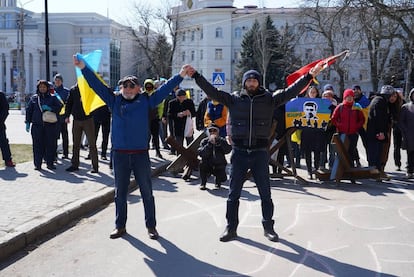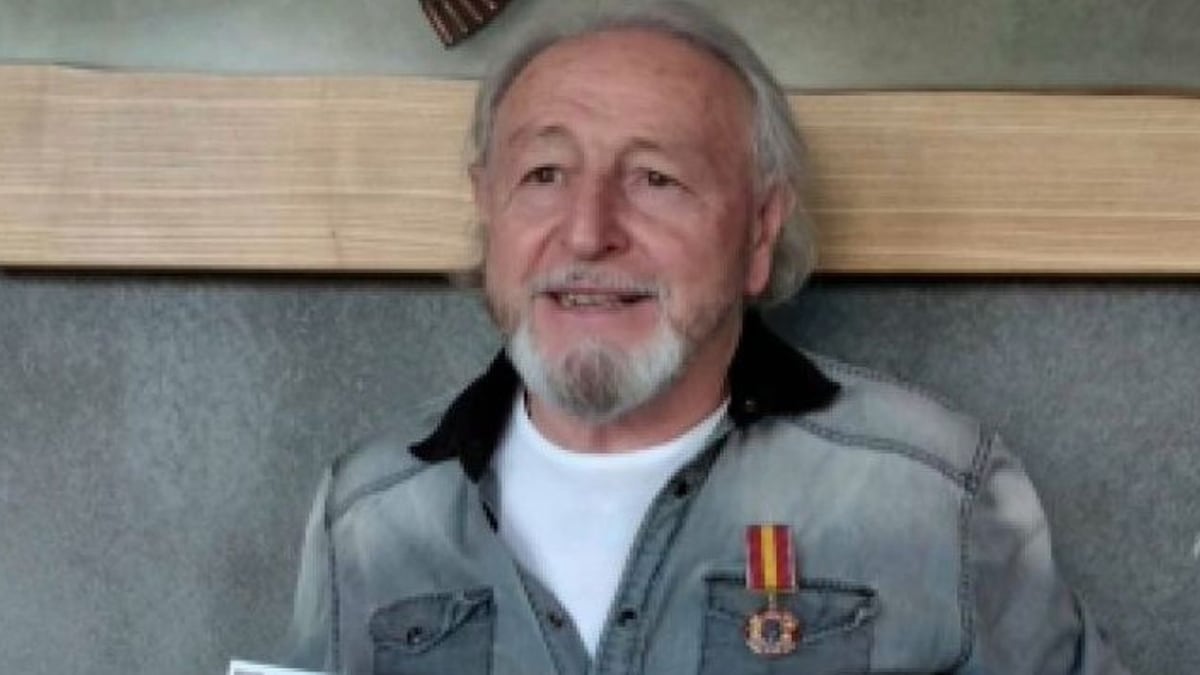Ukrainians call him Mario because Mariano is a strange name for them, difficult to remember in a Slavic country. But in Ukraine, they still remember him as “Super Mario,” as he was dubbed by KHPG, a Kharkiv-based human rights NGO that’s been tracking him. Mariano García Calatayud is a retiree from Carlet, a small town in Spain’s Mediterranean Valencia region, who decided to move to Ukraine in 2014. On March 19, 2022, three weeks after the Russian invasion began, the Russian security services arrested him in the occupied city of Kherson. Almost 40 months later, his family and friends do not know what has become of him.
In war-torn Ukraine, there is an abundance of foreigners with peculiar life circumstances. There are mercenaries, there are men and women who pursuing love, there are idealists, adventurers, and there are people fleeing irreparable problems in their home countries. García Calatayud is a difficult case to classify. In 2014, at the age of 66, recently retired and divorced from his wife, he decided to move to Kyiv. Until then, he had been a municipal employee of city of Carlet, where he served as the local government’s construction site manager. That year, war broke out in the Donbas region (formed by the Ukrainian provinces of Donetsk and Luhansk in the east) between pro-Russian separatists and Ukrainian forces. Also that year, Russia annexed the Crimean peninsula by force.
García Calatayud had no direct ties to Ukraine. He also didn’t speak Russian or Ukrainian. Tetiana Marina Olesksandrivna, his partner, and Francisco Santiesteban, a friend and colleague at the UGT labor union to which he was affiliated, say he had an idealized vision of the country because his father or his grandfather—they can’t remember which—was a Republican activist who, after the Spanish Civil War, sought shelter in the Soviet Union, in Odessa. One of his sons, David García, claims that Mariano’s father was never in this southern Ukrainian city, but he doesn’t know whether his grandfather might have been exiled there.
“Mariano is a convinced socialist, and he was very mixed up in his head, he had an image of the USSR that wasn’t real,” says Olena Lashtova, one of his closest friends in Ukraine. “He soon realized that Russia is an imperialist power, and he became committed to helping Ukraine,” she says.
David García points out that the main reason his father moved to Ukraine was his lifelong dedication to helping others. “He mainly helped children and schools,” says his son. “Of course, we tried to convince him to return to Spain, especially as the war escalated [before the invasion], but he felt fine in Ukraine,” he adds.
Lashtova met Mariano in 2016, during numerous trips they both made as volunteer workers, delivering essential aid to the population of Donetsk. He discovered Kherson, a key center of the Ukrainian resistance near Crimea in the south of the country, through a friend, says Oleksandrivna. “He fell in love with the city because he had lived in Kyiv for a year, and it was too big for him. In Kherson, everyone knew him and he lived a more family-oriented life,” adds Lashtova.
No one from the Spanish community in Kherson remains, says his partner. She herself has moved to Scotland, where she is undergoing medical treatment and trying to find a job. The city was liberated from Russian occupation in November 2022, but its location, right on the war front, exposes it to daily attacks by the invaders. Today, according to provincial authorities, only 20% of the pre-war population remains.
García Calatayud met Oleksandrivna six weeks before the Russian invasion began in February 2022. Despite the age difference (she is 30 years younger than him), they established a relationship. But it was short-lived. In the first days of the war, the Russians entered Kherson. It was the only provincial capital they occupied with such astonishing ease, thanks to an extensive network of collaborators.
Mariano was known for participating in all the local protests against the occupation. His friends recall him always being on the front lines, heckling the Russian military. Oleksandrivna, Santiesteban and Lashtova all agree that for days they warned the Spanish volunteer to leave the city, that the invader’s security forces surely had him in their sights.

“The day before his arrest, I told him to be careful, and on St. Joseph’s Day in Valencia [March 19], he disappeared,” Santiesteban recalls. “I asked him to leave Kherson,” Lashtova says, “that it would end badly, but he was very stubborn. We spoke every day, and when he didn’t answer my call on March 19 [2022], I figured that something had happened.”
His first incarceration was in the cells of the detention center on Teploenergetikiv Street in Kherson, a place known for its torture and interrogations. Once there, his trail was lost for a year.
Much of the search for García Calatayud has been carried out by Santiesteban in Spain and Oleksandrivna in Ukraine. She and the family contacted a team of Russian lawyers who mediated with the authorities of the invading country. The first official confirmation from the occupiers regarding Mariano’s whereabouts came in April 2023, a year after his arrest: the Russian military prosecutor’s office declared that the Spaniard was in Crimea, in the Sizo-2 prison in Simferopol, under investigation “to clarify his involvement in carrying out acts that threaten the security of the Russian Federation.”
Testimonies from Ukrainian citizens who met him in SIZO-2 reported that García Calatayud was tortured with electric shocks, attacks by guard dogs, and the extraction of teeth. This was reported in an Amnesty International campaign demanding his release. Santiesteban and Oleksandrivna are pessimistic about how he may have recovered from this experience, because he suffers from heart problems. Today, if he is still alive, he is 77 years old.
The occupying authorities of Crimea reported in the fall of 2023 that García Calatayud had left the peninsula for Kherson Province (the eastern half of this region is occupied). The military document did not specify whether he had left on his own or been transferred to another prison. It also did not specify whether any charges had been brought against him.
Last clue, Moscow
Since then, few clues have emerged about his possible whereabouts, all of them tenuous. Elena Taranova, spokesperson for the legal team following his case, explains that in the multiple requests sent to the Russian authorities, they have received vague responses from the occupying military administrations in the Black Sea, Kherson, Donetsk, and also from the central offices in Moscow. “Everyone is passing the buck among themselves; the only concrete responses were those from Crimea in 2023,” says Taranova.
David García said that the Spanish National Police notified him in February 2024 that his father could also be imprisoned in the Moscow region. Taranova explains that this is a possibility, but without any concrete evidence to support it. On July 1, the family held a videoconference with the Moscow Red Cross, which pledged to try to locate the Spaniard in the Russian capital.
The Russian government has never responded to requests for information from the Spanish government or the Red Cross. Oleksandrivna claims that during POW exchanges, the intelligence services of the Ukrainian Ministry of Defense (GUR) show the returning Ukrainians more than 80 photos of missing civilian foreigners, including García Calatayud. “He’s definitely changed a lot now; just look at how the released soldiers return, so emaciated,” says her partner.
70,000 missing, 300 foreigners
Artur Dobroserdov, the Ukrainian government commissioner for persons missing during the war, stated in a press conference on July 1 that there are 300 foreigners missing, both military personnel and civilians. Many of them are Latin American mercenaries. As of May, the Ukrainian Ministry of the Interior estimates the total number of missing persons at 70,000, the vast majority of whom are soldiers. These are people like another Spaniard, Miguel Ortiz, a soldier whose comrades believe died in combat in 2023, but since his body has not been recovered, his death cannot be confirmed.
At a press conference on July 1, the Ukrainian Ministry of the Interior presented a new website that unifies, for the first time, all available documentation and data on missing persons. It is expected to be available in English and Spanish in the coming months.
Sign up for our weekly newsletter to get more English-language news coverage from EL PAÍS USA Edition
